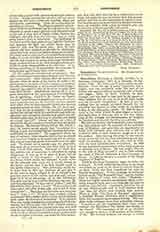

Conscience, HENDRIK, a Flemish novelist, b. at Antwerp, December 3, 1812; d. at Brussels, September 10, 1883. His father was French and his mother Flemish. Until the age of seven Conscience was a cripple, and was constantly under the care of his mother who used to tell him wonderful tales of fairies and angels. Little by little, however, he grew stronger, and was able to take part in the games of other children, but, as soon as he could read, books were his favorite companions. In fact, it was by reading that he mainly educated himself, for his schooling was limited to what would be considered today as the elementary grade. In 1830 he was a tutor in the Delin School, to some degree a fashionable institution of Antwerp, but at the very beginning of the struggle for independence he resigned his position and entered the army as a private.
His military service, which lasted six years, brought him into contact with the peasants of the northern part of Belgium, and gave him an opportunity to study their manners, their customs, and to see the attractive sides of their character, rough as it is on the surface. After leaving the army he was successively connected with the local administration of Antwerp, the academy of the same city, and, in 1857, with the local administration of Courtrui. In 1868 he was appointed commissioner of the royal museums of painting and sculpture. He had taught Flemish to the sons of King Leopold I, and in 1868 refused the chair of Flemish literature in the University of Ghent. In 1869 he became a member of the Royal Academy of Belgium.
While in the army Conscience began to write, but in French. In 1837, following the advice of his friend Jan Delaet, he made up his mind to write in Flemish, an idiom which was then considered too rude for literary composition. In this language he published his first novel, “Tile Wonderful Year”, and six months later a volume of verse and prose, “Phantazij”. These two highly romantic productions, where every-thing, romance, style, and even language, lay open to criticism, were failures. Conscience, however, was in no way dismayed and took in hand another work. This time his efforts were crowned with success.
When, in 1838, “The Lion of Flanders” appeared, it enriched Flemish literature with a masterpiece. After this success he never ceased writing. His corn plete works embrace more than a hundred volumes.
Conscience got his inspiration from three main sources: the fatherland, the family, and loyalty to the Church. His conception of art is an idealistic one, though he gives a vivid account of the realities of life. His avowed purpose was always to inspire
P. J. MARIQUE

